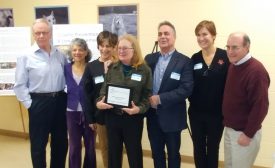
Sarah Ralston, fourth from left, with the ‘Educator of the Year’ award from the NJ Veterinary Foundation.
Sarah Ralston, professor in the Department of Animal Sciences, has received the inaugural “Educator of the Year” award from the New Jersey Veterinary Foundation. The award is based on Ralston’s years of nurturing pre-veterinary and veterinary students.
Ralston is credited with directly mentoring 113 students who have gone on to careers in veterinary medicine since 2000, and many more in prior years. She has been advisor to more than 30 George H. Cook Honors Scholars, about half of whom went on to veterinary school and others to medical school, graduate school, veterinary technical training and to positions with the U.S. Department of Agriculture.
One of her academic initiatives was the Young Horse Teaching and Research Program that ran from 1999 to 2013 and “provided hundreds of students the opportunity to not only learn some of the principles of doing scientific research but also to obtain hands-on experience in training young horses in ground manners, along with the teamwork, marketing and promotion involved with the program’s annual auction,” she said.
Ralston’s research on glucose and insulin metabolism, young horse and senior horse nutrition and, more recently, metabonomic studies of Osteochondritis dissecans (OCD) has made a considerable impact on equine diet and feeding, according to colleagues.
For the future, Ralston plans to retire from full-time teaching and research in the summer of 2017, “but continue to be available for consults, advising of students and doing research in collaboration with colleagues at Princeton University,” she said.
Reflecting on her career at Rutgers, she stated: “I am extremely proud of the fact that in the 25-plus years that I have used a wide variety of horses – from old and cantankerous to young and wild – in my teaching program, I have never had any students, either experienced or totally novice, get seriously injured on my watch. We’ve had a few bruises, stepped on toes, and an occasional nip, but those only increased the students’ awareness of the need for caution and total attention when working around horses.”
Colleagues also attribute her successful placement of her students in veterinary school in part to the Young Horse Teaching and Research Program, which prepared students to handle large animals – a valuable achievement and skill in an urbanized society.
And on a personal level, a good deal of Ralston’s success may be attributed to the fact that she holds a veterinary medical degree along with her doctoral degree and is herself a horse owner and competitor.
The New Jersey Veterinary Foundation is the charitable arm of the New Jersey Veterinary Medical Association. Since 1975, the foundation has awarded more than one million dollars in scholarship grants, interest-free loans and forgivable loans to New Jersey veterinary students.

